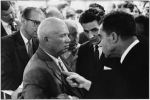From today’s news wire, Washington, D.C.:
President Barack Obama today submitted his nomination of Bill Gates as Secretary for the soon to be announced Department of Technology. Denis McDonough, White House Chief of Staff, made the announcement this morning at an impromptu press conference in the East Room of the White House.
Mr. Gates, co-founder and current Chairman of Microsoft, has amassed much criticism from those that consider his business tactics at Microsoft to be anti-competitive. However, few will argue that his success in business has been anything less than spectacular since he and his co-founder, Paul Allen, founded the software giant 38 years ago this month.
The conditions for his appointment as Secretary of Technology include him divesting himself of all interest in Microsoft and resigning his position of non-executive Chairman of that corporation. He has also pledged to personally donate all the computer hardware and software for the initial administrative set-up of the new department. The operation will temporarily be housed in leased space in Langley, VA, until its new facilities have been constructed at a yet to be determined Virginia location.
McDonough outlined the unique position of the department, in which it will take over all technology-related functions in Washington, with the exception of the NSA and CIA, which will manage their own technology divisions. The department will also take over immediate control of DARPA (Defense Advanced Projects Research Agency) from the Dept. of Defense, a move which has surprised many in Washington.
When asked what the specific functions of the new department are to be, McDonough responded “Recent developments on the international front have illustrated that staying at the forefront of technology is essential in order to defend the nation against cyber-attacks and other forms of digital hostility. Secretary Gates’ first priorities will be to mount effective defenses against such activities and develop decisive countermeasures, first within the greater national infrastructure, then trickling down to the Internet, in general.
“He will also dedicate a large portion of his efforts to creating programs conducive to establishing and maintaining significant design and development of hi-tech industry here in the United States. In this, he’ll be assisted by the Department of Commerce and the NSA,” added McDonough.
Asked whether the Administration anticipated any significant resistance in Congress for the formation of the new department, with the present economic situation in the country, the Chief of Staff reported that the all the activities of the Dept. of Technology were already funded elsewhere and would simply be moved to reflect the new hierarchy. Construction of the new buildings won’t begin until 2014, at which time the President’s budget will be amended to accommodate the construction. He also disclosed that Mr. Gates would be deferring any salary while serving as Secretary.
“This is a crucial mission that both the President and Secretary Gates feel is of the utmost urgency, as is reflected by the Secretary’s refusal of a salary and his donation of computer hardware and software that is expected to exceed 80 million dollars.” said the Chief of Staff. “We’re confident that the House and Senate, once they’ve seen the numbers, will agree that this is a win-win situation for the nation and will serve critical national security interests.”
The question of how acceptable, as a candidate, Mr. Gates will be seen by Congress remains to be seen. Many Republican members have expressed displeasure with his recent statements to the BBC, in which he said he feels that taxes must go up, and they should be higher for the rich. Additionally, many on the other side of the aisle find his success as a capitalist inherently troubling.
Mr. Gates’ net worth was reported by Forbes to be 67 billion dollars at this writing, making him the wealthiest man in the United States and the second wealthiest in the world. Moreover, the Bill and Melinda Gates Foundation donates a minimum of 1.5 billion dollars each year to a broad array of health and education causes, which has garnered much respect for the Secretarial candidate.
Mr. Gates was unavailable for comment, but we’ll update as soon as he responds.
Now go have a great April Fool’s Day! But first, ask yourself this… if you saw this spoof on any other day of the year (and on a more credible site), exactly what part of this would be unbelievable?















Recent Comments